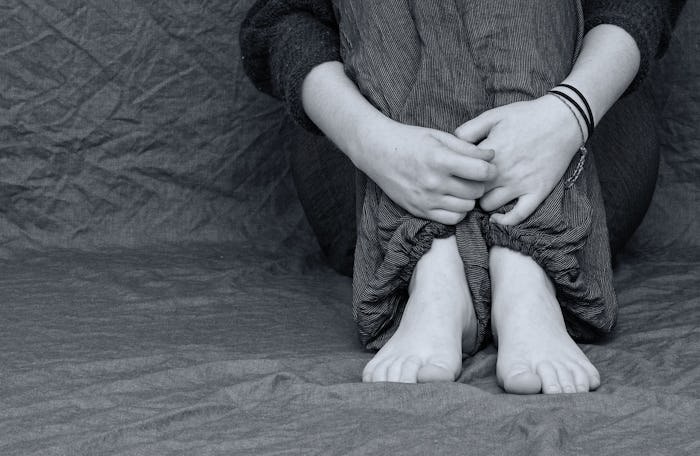Life
The Reason You May Feel More Depressed When On Birth Control
For many women, taking birth control is a vital part of their overall health. For others, however, birth control can be the cause of some serious mood disruptions. While there are side effects associated with any medication, it's important to know the risk before you pick up a prescription. So does birth control make you depressed? Deciphering the relationship between hormones, birth control, and depression symptoms is a difficult task, but one worth taking on when it comes to your physical and mental health.
The potential link between hormonal contraceptives and depression has been studied for years, and recent data appears to affirm that a connection does, in fact, exist. In many cases, taking hormonal methods of birth control may be linked to a depression diagnosis later on, according to a November 2016 article in JAMA Psychiatry. This massive study, which used medical data from over one million women in Denmark, suggests depression symptoms may be a side effect of hormonal birth control methods.
However, not all research confirms the aforementioned finding. According to a 2012 study from the Archives of Gynecology and Obstetrics, depression is not considered a common side effect of hormonal birth control. After reviewing medical database information from 1976 to 2010, researchers found the links between birth control and depression to be limited and, as a result, difficult to prove. Given the numerous brands and types of hormonal birth control available, the data contained many variables that made reaching a definitive conclusion difficult. In fact, depression rates among women of childbearing age may not be influenced by hormonal contraceptives overall. The apparent link could merely be coincidence.
Whatever the case, many individual women report low mood problems while on hormonal birth control. In fact, depression is often one of the top reasons women stop taking birth control, according to Healthline. Whether or not birth control is directly responsible for depression, or just happens to occur at the same time, many women dislike the way birth control appears to affect their mood.
If you are currently struggling with feelings of depression that may be attributed to hormonal birth control, you have options. Opting for a form of birth control that uses low doses of hormones, such as the Skyla or Kyleena IUD, may help ward off feelings of depression, according to the website for Shape. Lastly, a form of birth control that uses no hormones, such as a condom or the copper-releasing ParaGard IUD, are worth considering. Work with your doctor to find the best birth control method for your own physical and mental wellbeing.
If you struggle with depression or feelings of self-harm, please seek professional help or call 1-800-273-8255 for the National Suicide Prevention Lifeline.
